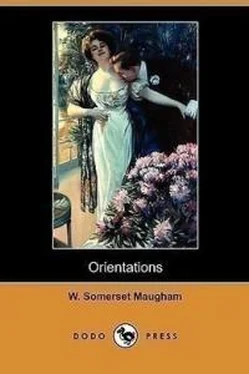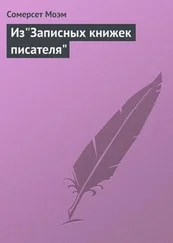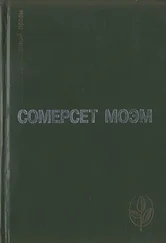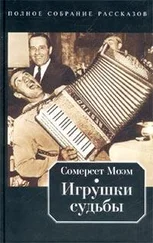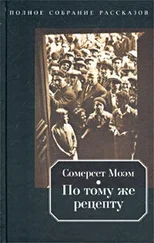Уильям Моэм - Orientations
Здесь есть возможность читать онлайн «Уильям Моэм - Orientations» весь текст электронной книги совершенно бесплатно (целиком полную версию без сокращений). В некоторых случаях можно слушать аудио, скачать через торрент в формате fb2 и присутствует краткое содержание. Год выпуска: 2014, Издательство: epubBooks Classics, Жанр: Классическая проза, на английском языке. Описание произведения, (предисловие) а так же отзывы посетителей доступны на портале библиотеки ЛибКат.
- Название:Orientations
- Автор:
- Издательство:epubBooks Classics
- Жанр:
- Год:2014
- ISBN:нет данных
- Рейтинг книги:5 / 5. Голосов: 1
-
Избранное:Добавить в избранное
- Отзывы:
-
Ваша оценка:
- 100
- 1
- 2
- 3
- 4
- 5
Orientations: краткое содержание, описание и аннотация
Предлагаем к чтению аннотацию, описание, краткое содержание или предисловие (зависит от того, что написал сам автор книги «Orientations»). Если вы не нашли необходимую информацию о книге — напишите в комментариях, мы постараемся отыскать её.
Orientations — читать онлайн бесплатно полную книгу (весь текст) целиком
Ниже представлен текст книги, разбитый по страницам. Система сохранения места последней прочитанной страницы, позволяет с удобством читать онлайн бесплатно книгу «Orientations», без необходимости каждый раз заново искать на чём Вы остановились. Поставьте закладку, и сможете в любой момент перейти на страницу, на которой закончили чтение.
Интервал:
Закладка:
III
On Sunday, Mr Clinton put on Sunday clothes, and heading the little procession formed by Mrs Clinton and the two children, went to church, carrying in his hand a prayer book and a hymn book. After dinner he took a little walk with his wife along the neighbouring roads, avenues and crescents, examining the exterior of the houses, stopping now and then to look at a garden or a well–kept house, or trying to get a peep into some room. Mr and Mrs Clinton criticised as they went along, comparing the window curtains, blaming a door in want of paint, praising a well–whitened doorstep….
The Clintons lived in the fifth house down in the Adonis Road, and the house was distinguishable from its fellows by the yellow curtains with which Mrs Clinton had furnished all the windows. Mrs Clinton was a woman of taste. Before marriage, the happy pair, accompanied by Mrs Clinton's mother, had gone house–hunting, and fixed on the Adonis Road, which was cheap, respectable and near the station. Mrs Clinton would dearly have liked a house on the right–hand side of the road, which had nooks and angles and curiously–shaped windows. But Mr Clinton was firm in his refusal, and his mother–in–law backed him up.
'I dare say they're artistic,' he said, in answer to his wife's argument, 'but a man in my position don't want art—he wants substantiality. If the governor'—the governor was the senior partner of the firm—'if the governor was going to take a 'ouse I'd 'ave nothing to say against it, but in my position art's not necessary.'
'Quite right, James,' said his mother–in–law; 'I 'old with what you say entirely.'
Even in his early youth Mr Clinton had a fine sense of the responsibility of life, and a truly English feeling for the fitness of things.
So the Clintons took one of the twenty–three similar houses on the left–hand side of the street, and there lived in peaceful happiness. But Mr Clinton always pointed the finger of scorn at the houses opposite, and he never rubbed the back of his hands so heartily as when he could point out to his wife that such–and–such a number was having its roof repaired; and when the builder went bankrupt, he cut out the notice in the paper and sent it to his spouse anonymously….
At the beginning of August, Mr Clinton was accustomed, with his wife and family, to desert the sultry populousness of London for the solitude and sea air of Ramsgate. He read the Daily Telegraph by the sad sea waves, and made castles in the sand with his children. Then he changed his pepper–and–salt trousers for white flannel, but nothing on earth would induce him to forsake his top hat. He entirely agreed with the heroes of England's proudest epoch—of course I mean the middle Victorian—that the top hat was the sign–manual, the mark, the distinction of the true Englishman, the completest expression of England's greatness. Mr Clinton despised all foreigners, and although he would never have ventured to think of himself in the same breath with an English lord, he felt himself the superior of any foreign nobleman.
'I dare say they're all right in their way, but with these foreigners you don't feel they're gentlemen. I don't know what it is, but there's something, you understand, don't you? And I do like a man to be a gentleman. I thank God I'm an Englishman!'
IV
Now, it chanced one day that the senior partner of the firm was summoned to serve on a jury at a coroner's inquest, and Mr Clinton, furnished with the excuse that Mr Haynes was out of town, was told to go in his stead. Mr Clinton had never performed that part of a citizen's duties, for on becoming a householder he had hit upon the expedient of being summoned for his rates, so that his name should be struck off the coroner's list; he was very indifferent to the implied dishonour. It was with some curiosity, therefore, that he repaired to the court on the morning of the inquest.
The weather was cold and grey, and a drizzling rain was falling. Mr Clinton did not take a 'bus, since by walking he could put in his pocket the threepence which he meant to charge the firm for his fare. The streets were wet and muddy, and people walked close against the houses to avoid the splash of passing vehicles. Mr Clinton thought of the jocose solicitor who was in the habit of taking an articled clerk with him on muddy days, to walk on the outside of the street and protect his master from the flying mud. The story particularly appealed to Mr Clinton; that solicitor must have been a fine man of business. As he walked leisurely along under his umbrella, Mr Clinton looked without envy upon the city men who drove along in hansoms.
'Some of us,' he said, 'are born great, others achieve greatness. A man like that'—he pointed with his mind's finger at a passing alderman—'a man like that can go about in 'is carriage and nobody can say anything against it. 'E's worked 'imself up from the bottom.'
But when he came down Parliament Street to Westminster Abbey he felt a different atmosphere, and he was roused to Jeremiac indignation at the sight, in a passing cab, of a gilded youth in an opera hat, with his coat buttoned up to hide his dress clothes.
'That's the sort of young feller I can't abide,' said Mr Clinton. 'And if I was a member of Parliament I'd stop it. That's what comes of 'aving too much money and nothing to do. If I was a member of the aristocracy I'd give my sons five years in an accountant's office. There's nothing like a sound business training for making a man.' He paused in the road and waved his disengaged hand. 'Now, what should I be if I 'adn't 'ad a sound business training?'
Mr Clinton arrived at the mortuary, a gay red and white building, which had been newly erected and consecrated by a duke with much festivity and rejoicing. Mr Clinton was sworn with the other jurymen, and with them repaired to see the bodies on which they were to sit. But Mr Clinton was squeamish.
'I don't like corpses,' he said. 'I object to them on principle.'
He was told he must look at them.
'Very well,' said Mr Clinton. 'You can take a 'orse to the well but you can't make 'im drink.' When it came to his turn to look through the pane of glass behind which was the body, he shut his eyes.
'I can't say I'm extra gone on corpses,' he said, as they walked back to the Court. 'The smell of them ain't what you might call eau–de–Cologne .' The other jurymen laughed. Mr Clinton often said witty things like that.
'Well, gentlemen,' said the coroner, rubbing his hands, 'we've only got three cases this morning, so I sha'n't have to keep you long. And they all seem to be quite simple.'
V
The first was an old man of seventy; he had been a respectable, hard–working man till two years before, when a paralytic stroke had rendered one side of him completely powerless. He lost his work. He was alone in the world—his wife was dead, and his only daughter had not been heard of for thirty years—and gradually he had spent his little savings; one by one he sent his belongings to the pawn shop, his pots and pans, his clothes, his arm–chair, finally his bedstead, then he died. The doctor said the man was terribly emaciated, his stomach was shrivelled up for want of food, he could have eaten nothing for two days before death…. The jury did not trouble to leave the box; the foreman merely turned round and whispered to them a minute; they all nodded, and a verdict was returned in accordance with the doctor's evidence!
The next inquiry was upon a child of two. The coroner leant his head wearily on his hand, such cases were so common! The babe's mother came forward to give her evidence—a pale little woman, with thin and hollow cheeks, her eyes red and dim with weeping. She sobbed as she told the coroner that her husband had left her, and she was obliged to support herself and two children. She was out of work, and food had been rather scanty; she had suckled the dead baby as long as she could, but her milk dried up. Two days before, on waking up in the morning, the child she held in her arms was cold and dead. The doctor shrugged his shoulders. Want of food! And the jury returned their verdict, framed in a beautiful and elaborate sentence, in accordance with the evidence.
Читать дальшеИнтервал:
Закладка:
Похожие книги на «Orientations»
Представляем Вашему вниманию похожие книги на «Orientations» списком для выбора. Мы отобрали схожую по названию и смыслу литературу в надежде предоставить читателям больше вариантов отыскать новые, интересные, ещё непрочитанные произведения.
Обсуждение, отзывы о книге «Orientations» и просто собственные мнения читателей. Оставьте ваши комментарии, напишите, что Вы думаете о произведении, его смысле или главных героях. Укажите что конкретно понравилось, а что нет, и почему Вы так считаете.
